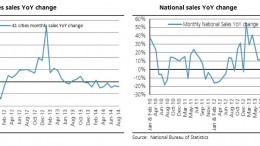Housing law sinks supply of flats for rent by 30% in five months
Housing for rent has largely vanished in recent months in both Catalonia and the Community of Madrid. The supply of flats for rent has plummeted since the Housing Law came into force five months ago by 35.32% in the case of the Madrid region and by 34.92% in the case of Catalonia, according to an analysis carried out by the National Federation of Real Estate Associations (FAI), which puts the…









